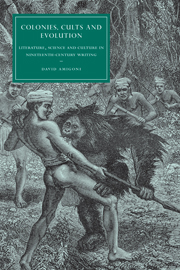Book contents
- Frontmatter
- Contents
- Acknowledgements
- Introduction: literature, science and the hothouse of culture
- 1 ‘Symbolical of more important things’: writing science, religion and colonialism in Coleridge's ‘culture’
- 2 ‘Our origin, what matters it?’: Wordsworth's excursive portmanteau of culture
- 3 Charles Darwin's entanglements with stray colonists: cultivation and the species question
- 4 ‘In one another's being mingle’: biology and the dissemination of ‘culture’ after 1859
- 5 Samuel Butler's symbolic offensives: colonies and mechanical devices in the margins of evolutionary writing
- 6 Edmund Gosse's cultural evolution: sympathetic magic, imitation and contagious literature
- Conclusion: culture's field, culture's vital robe
- Notes
- Bibliography
- Index
- CAMBRIDGE STUDIES IN NINETEENTH-CENTURY LITERATURE AND CULTURE
6 - Edmund Gosse's cultural evolution: sympathetic magic, imitation and contagious literature
Published online by Cambridge University Press: 22 September 2009
- Frontmatter
- Contents
- Acknowledgements
- Introduction: literature, science and the hothouse of culture
- 1 ‘Symbolical of more important things’: writing science, religion and colonialism in Coleridge's ‘culture’
- 2 ‘Our origin, what matters it?’: Wordsworth's excursive portmanteau of culture
- 3 Charles Darwin's entanglements with stray colonists: cultivation and the species question
- 4 ‘In one another's being mingle’: biology and the dissemination of ‘culture’ after 1859
- 5 Samuel Butler's symbolic offensives: colonies and mechanical devices in the margins of evolutionary writing
- 6 Edmund Gosse's cultural evolution: sympathetic magic, imitation and contagious literature
- Conclusion: culture's field, culture's vital robe
- Notes
- Bibliography
- Index
- CAMBRIDGE STUDIES IN NINETEENTH-CENTURY LITERATURE AND CULTURE
Summary
HARROWING OF SELF
Edmund Gosse's Father and Son (1907) offered itself to its original early twentieth-century readers as a reliable and representative ‘document’ and ‘record’ concluding the nineteenth-century conflict between religion and evolutionary life sciences, and examining its impact upon a particular history of mental cultivation. The narrative of educational development, of self-culture, recalls the young Gosse's relationship with his widowed father, the nineteenth-century popular naturalist Philip Henry Gosse, whose Calvinist theology and insistence on the literal fact of Biblical Creation was challenged by Lyell's geology and Darwin's theory of evolution by natural selection. The narrative also records the way in which Philip Henry Gosse responded to the Darwinian challenge by writing Omphalos (1857), an attempt to reconcile geology and Genesis that signally failed to convince anybody on either side of the debate. Gosse's narrative presents this as a decisive conflict, with Darwinism on the side of development against stagnant ‘Puritanism’: ‘of the two human beings here described, one was born to fly backward, the other could not help being carried forward’ (31) in the direction of individual, aesthetic self-fashioning (211). It is significant that, in presenting his work as a ‘document’, Edmund Gosse should have contrasted it in ‘the present hour’ with fiction that assumed ‘forms so ingenious and so specious’ (29). Gosse was responding to an Edwardian vogue for what the contemporary critic Stephen Reynolds described as ‘autobiografiction’, a hybrid mix of autobiography, social investigation and fiction.
- Type
- Chapter
- Information
- Colonies, Cults and EvolutionLiterature, Science and Culture in Nineteenth-Century Writing, pp. 164 - 186Publisher: Cambridge University PressPrint publication year: 2007

